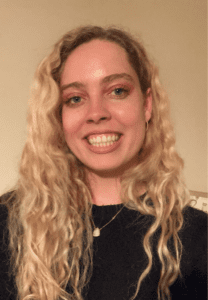Author: Ana Gimber
In a 2022 survey, respondents reported that living with Bipolar l Disorder can be a difficult and isolating experience that impacts many aspects of their lives. Approximately four of five respondents (81%) agreed** that they felt like no one understands what they are going through living with BD-I and more than three-quarters of respondents (77%) agreed that living with BD-I makes them feel isolated and alone. Among respondents living with BD-I who had been employed or in school, 51% said they were less productive at work or at school and 47% had tried to hide their condition from colleagues or classmates. Ana responds to these findings and then shares how she has found connection.
Nearly half of the survey respondents reported they have tried hiding their condition from classmates or colleagues. Hiding my bipolar made me feel isolated and alone. It wasn’t until I found support in others by sharing my experience living with bipolar that I felt better understood.
When diagnosed at age 13, it was a challenge to stay awake, keep up a good face, and break free from the worries that were burrowing into me and wearing me down. My diagnosis felt like the biggest secret and I was terrified if someone found out, they would think I was crazy. When I was obviously struggling I would say “Oh, I’m just having an off day”. I didn’t know how long I could keep that up. I felt like I only had so many excuses, and it was mentally exhausting. One time when I was excusing yet another confused moment, a friend stopped me and said “You are ALWAYS having an off day, Ana”. I wished I could say why I had so many “off days”.
Not long after that comment, I impulsively released my secret to a close friend by simply telling her “I’m bipolar”. She froze, I cried, and our friendship faded immediately after. I’d never thought about how I would share my diagnosis. I became discouraged and it took me a while to feel comfortable to share again. I learned to be prepared if people don’t know how to react like the first person I told. They most likely needed to be more informed. Three years later, I tried again but this time, I knew ahead of time what I wanted to say and was more prepared. The two girls’ were both extremely warm, empathetic, and we became better friends. I realized that understanding was always there, just waiting to be unlocked and that hiding a diagnosis is not worth the pain.
I usually hold a conversation when my bipolar is getting in the way of our relationship or I need their support. I decide what I want to say and that helps me be more prepared. I ask myself, How can this person help me? People sometimes ask me that question and it is good to be ready to ask for what you need. I ask “Do you know anything about bipolar?”. I can further explain depending on what they know. I emphasize everyone’s experience with bipolar is unique before sharing my own. This is also a good opportunity to help people understand bipolar so they can better support other people in their life too!
With time, having a conversation about having bipolar has become much easier and it has led me to more deep and lasting relationships but I am always prepared if I don’t receive the response I hope for. It has surprised me that many people either know someone with bipolar or have a mental health challenge of their own. After I let go of my secret to one friend, it turned out that she also has bipolar and our friendship is now even more special. I am so grateful to find empathy, warmth, understanding, and support that helps me not to feel alone anymore.
Blogger Bio
 Ana Gimber was diagnosed at age 12 and is a Whittier College graduate with a Bachelor of the Arts degree in Psychology. She shares her story to help stop the stigma surrounding bipolar. She was born and raised in San Diego, CA and loves to rollerblade, paint, and journal.
Ana Gimber was diagnosed at age 12 and is a Whittier College graduate with a Bachelor of the Arts degree in Psychology. She shares her story to help stop the stigma surrounding bipolar. She was born and raised in San Diego, CA and loves to rollerblade, paint, and journal.
The content of the International Bipolar Foundation blogs is for informational purposes only. The content is not intended to be a substitute for professional medical advice, diagnosis, or treatment. Always seek the advice of your physician and never disregard professional medical advice because of something you have read in any IBPF content.


